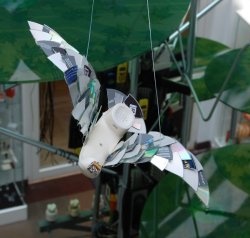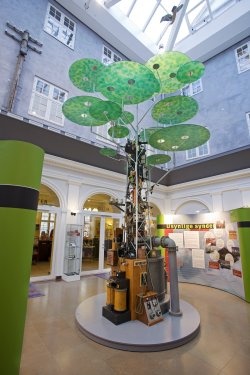A Great Tele Tree
05. May. 2009

The tele birds are created by Randi Brøndel Larsen. Read more on www.randibrondel.dk. The materials are telephone parts and CD-ROM's.
New Exhibition about Communication and Climate
A closer inspections shows that the tree contains things like old telephones, arc transmitters, mobile phones, computers and printed circuit boards. The only thing which is actually made of wood is what is contained in the different components the tree is built of. For this is a tele tree; built of scrap which might otherwise have ended up in a random rubbish bin. The tele tree forms part of the museum's new exhibition How many cows does an e-mail pollute, mum? which can be seen in the foyer and on the balcony until 3rd January 2010.
The exhibition is focusing on communication and climate and deals among other things with e-waste. The expression covers the vast quantities of electronic waste which end up in as well the right as the wrong places every year; a growing, but in no way a new phenomenon.

The tele tree is created by the company 10TONS which is among other things building zoological and botanical models. Read more on http://10tons.dk/. ;
Replacement
For more than a hundred years the development within telecommunication has resulted in frequent replacement of telephones, exchange material, and the buildings that contained both. Each time it has caused heaps of waste, e.g. kilometres of cables and thousands of telephone instruments which all at once became old-fashioned and redundant.
In May 1953, the old manually operated exchange in Aarhus from 1910 was replaced by a brand new fully automatic exchange. However, the revolution created temporary chaos when everybody wanted to test the system during the first days: A telephone with a dial for direct distance dialling - that was really something new!
The Bomb in your Pocket
History repeats itself at still shorter intervals. Now it is no longer just land line telephones which are being discarded, but also mobile phones and computers. The new devices contain many deleterious substances which we do not want to leave in nature. An ordinary mobile contains for instance plastic, iron, zinc, and gold. Did you know that we could recycle 2.5 tons lead, 35 tons copper, and 32 kilos pure gold every year if all Danes handed in their used mobile phones at the recycling centre?
Post & Tele Museum's tele tree symbolizes the vast amount of vaste caused by the way we have been using and scrapping means of communications during recent years. As the same time the tree is a time line which illustrates the history of telecommunications in a simple way when your eyes move upwards and around the trunk. At the bottom you find the oldest wall telephones made of wood as well as the telegraph operators' tool, the telegraph key. Further up the trunk wood is replaced by Bakelite and even later by plastic. We end up with the mobile phones and computers of our time.
The exhibition How many cows does an e-mail pollute, mum? Can be seen in the foyer and on the balcony of Post & Tele Museum until 3rd January 2010.
This article may be copied or quoted with MuseumsPosten, Post & Tele Museum as source.
Comment this article
Only serious and factual comments will be published.